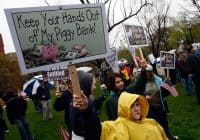It is that time of the year again when Wall Street starts issuing its forecasts for the coming year. We have seen the 2014 outlook from Merrill Lynch this Monday with new observations on 2014. All in all, the report is less cautious than the last two years based upon no major clouds on the horizon.
The Merrill Lynch economics team points out that the budget deficit has fallen from 10% to 4% of GDP. Also noted is that banks are recapitalized and are working off their bad loans. Housing has started to recover, corporations are flush with profits and cash, households have cut their debt servicing costs, and even state and local governments have stopped cutting their budgets. The team further points out that there will likely be no additional fiscal austerity and there will not likely be another shutdown.
What should stand out is that U.S. GDP growth is expected to accelerate from an average of 2.2% in the last four years up to 2.6% in 2014 and then up to 3.2% in 2015.
European growth is expected to remain low as policymakers “amplified the acute phase of the European crisis” by demanding the peripheral countries tighten fiscal policy in a recession or be denied funding. Merrill Lynch believes that the European Central Bank will likely refrain from easing policy significantly. The firm’s Euro area team expects only 0.8% GDP growth in 2014 and sees the unemployment rate stuck around the 12% mark.
There are brief general notes issued for the rest of the world as well:
- Abenomics is expected to deliver another year of 2% growth in Japan.
- Growth in the United Kingdom should rise from about 1.4% this year to 2.7%.
- Emerging market growth should pick up modestly.
- Turkey, South Africa, Indonesia, Ukraine and Venezuela top the Merrill Lynch vulnerability ranking.
And on our own Federal Reserve and the quantitative easing… Inflation is likely to remain around 1% for an extended period as global pressures have faded as commodity markets cool and emerging markets slow down. The Fed exit will be slower than the consensus expects – more likely to start in March rather than January. The firm said, “QE will not end until December. And we expect the first rate hike to come in the first quarter of 2016.”
100 Million Americans Are Missing This Crucial Retirement Tool
The thought of burdening your family with a financial disaster is most Americans’ nightmare. However, recent studies show that over 100 million Americans still don’t have proper life insurance in the event they pass away.
Life insurance can bring peace of mind – ensuring your loved ones are safeguarded against unforeseen expenses and debts. With premiums often lower than expected and a variety of plans tailored to different life stages and health conditions, securing a policy is more accessible than ever.
A quick, no-obligation quote can provide valuable insight into what’s available and what might best suit your family’s needs. Life insurance is a simple step you can take today to help secure peace of mind for your loved ones tomorrow.
Click here to learn how to get a quote in just a few minutes.
Thank you for reading! Have some feedback for us?
Contact the 24/7 Wall St. editorial team.


